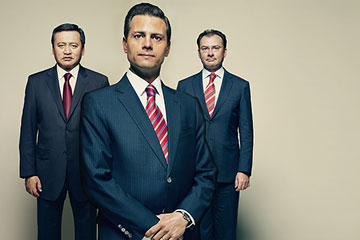
Left to right: Miguel Ángel Osorio Chong, Interior Minister; Enrique Peña Nieto, President; Luis Videgaray Caso, Finance Minister
(2 of 5)
Peña Nieto casts himself as a fresh, young reformer. But he is also a product of the ruling elite that helped lead Mexico to the brink of ruin. His uncle and godfather were both governors of the state of Mexico, a position he assumed in 2005 when he was 38. He is a member of the Institutional Revolutionary Party (PRI), which ruled Mexico for 71 years--often with the help of election results widely considered fraudulent--until it was knocked out of power in 2000. Peña Nieto revived the PRI's fortunes by promising bold and tangible results to a country largely resigned to corruption and stasis. "Between 2000 and 2012, the opposition parties deliberately blocked major reforms that were necessary," says Wood. Peña Nieto promised to overhaul the state-run energy sector and the tax system and contain the drug war's savagery.
Adding a glow to the ambitious promises were the candidate's famous aesthetics: Peña Nieto's rallies were sometimes charged with subtle sexual energy. Or not so subtle: "Peña Nieto, bombón, te quiero en mi colchón" ("Peña Nieto, sweetie, I want you in my bed"), women would chant.
Peña Nieto's opponents did their best to turn this against him by tagging him as a shallow pretty boy. They were particularly gleeful when, during an appearance at a Guadalajara book fair, he struggled to name three books that had shaped his life ("and that's spotting him the Bible," says a former U.S. official with a chuckle).
Eventually, in a three-way race in the summer of 2012, Peña Nieto won just 38% of the vote--hardly a mandate for generational change. The secret to his recent success lies in the way he then built a powerful legislative coalition. After meeting secretly with the two leading opposition parties, he struck the kind of legislative grand bargain that has eluded his counterpart across the northern border. The resulting Pacto por México gave liberals higher taxes on the wealthy and conservatives an end to Mexico's ban on the re-election of politicians, while Peña Nieto won support for a raft of other reforms, including opening up the country's oil monopoly.
Even after the deal was announced, jaded observers doubted that Mexico's political system could deliver. But whatever he may lack in literary erudition, Peña Nieto compensates for in political prowess. He is assisted by a group of young technocrats, many with advanced degrees from outside Mexico, who together put a decidedly more modern face on a very old and very distrusted PRI machine. Among them are the President's longtime top adviser and now Finance Minister, Luis Videgaray Caso, a 45-year-old economist with an MIT doctorate, and Emilio Lozoya Austin, the new 39-year-old chief of the state oil company, Pemex, who holds a Harvard master's degree. Running the powerful Interior Ministry is 49-year-old Miguel Angel Osorio Chong, Mexico's new point man on the drug war. All of them met with TIME in Mexico City recently.
Sitting in a personal office near a bright red phone that connects him directly to the President, Videgaray says talk that he is the true mastermind behind Peña Nieto's reforms is "not at all the reality." Instead, he says, "the time was right. Mexico needed fundamental changes."
New Politics of Oil
